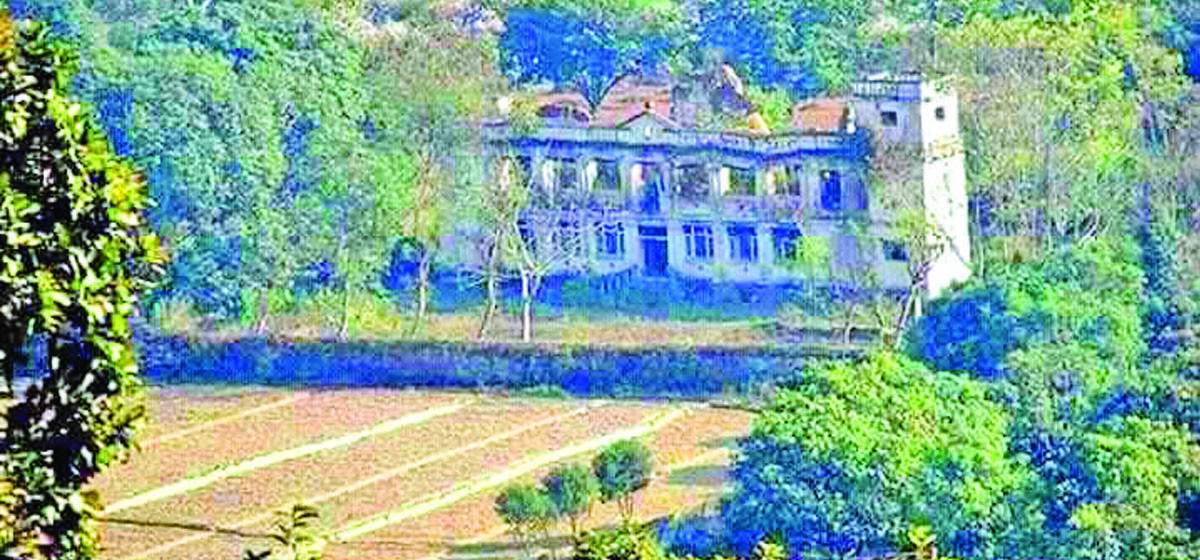KATHMANDU, Aug 29: The fate of Shera Durbar, a historic palace in Nuwakot, remains mired in political maneuvering and bureaucratic inaction. Despite repeated directives and investigations, the Annapurna Farming Company—under whose name the palace and 164 ropani of land are registered—has not returned the property to the government.
Six months ago, the Nuwakot Land Revenue Office issued a seven-day deadline to the company’s operator, Bikesh Shrestha, demanding clarification on why government land was registered in the company’s name and how it was being used. Although a reply was submitted, the process has since stalled. The Ministry of Land Management, Cooperatives, and Poverty Alleviation (MoLCPA) has maintained that the matter is “still under investigation,” effectively deferring action.
The Central Investigation Bureau (CIB) of Nepal Police had also recommended a year ago that Shera Durbar and its land be restored to the government, but both the ministry and higher authorities have delayed implementation. “Even now, the land of Shera Durbar is still under investigation,” admitted Ganesh Prasad Bhatta, spokesperson for the MoLCPA.
Shera Durbar land case: Authorities to bring 164 ropanis under...

Multiple officials sent to Nuwakot to pursue the case have backed away under intense political pressure. Former Chief Land Revenue Officers Min Bahadur Bhattarai and Debi Bahadur Bhandari both abandoned the process, requesting transfers after facing resistance. Their successors also extended deadlines without making progress, while the acting chief currently in charge has effectively shelved the issue.
The controversy first came to light in December 2024, when Republica Daily revealed that the palace and land were registered under Annapurna Farming. CIB later confirmed that the registration had been carried out through forgery. The bureau recommended that 164 of the 184 ropani be reclaimed, considering Shera Durbar an important archaeological heritage site. But the Department of Archaeology (DoA) has remained conspicuously silent.
Officials privately acknowledge that political interference has blocked the process. “Since individuals linked to Maoist Center Chairman Pushpa Kamal Dahal’s secretariat are involved, the issue carries heavy political pressure,” said one ministry source. “Even Prime Minister KP Sharma Oli has not given clear direction. The minister alone cannot decide.”
Shera Durbar, built during the reign of King Prithvi Narayan Shah, historically came under the names of Helen Shah and Jayanti Shah, relatives of King Tribhuvan. Following land reform legislation, 18 ropani were retained in their names, while 163 ropani should have reverted to the government. Instead, after the Maoists entered the peace process in 2006, the land was gradually transferred to private ownership and later to Annapurna Farming.
The land was initially registered under Gauri Shankar Farming in 1979 and later transferred to Annapurna Farming, where shares were traded among politically connected individuals. By 2016, Bikesh Shrestha had become a majority shareholder, with additional stakes held by Ajay Kumar Suryabanshi and others. In 2023, Shrestha’s son Manobal also became a shareholder, consolidating the family’s hold.
Sources claim that when CIB attempted to investigate in 2022, Dahal—then prime minister—halted the process. Although Dahal has denied involvement, reports suggest he assured that the property would be returned to the state.
For now, the palace and its surrounding land remain locked in political limbo. Investigations drag on, officials shuffle in and out of postings under pressure, and both the MoLCPA and DoA avoid responsibility—leaving one of Nepal’s historic palaces in private hands.



































